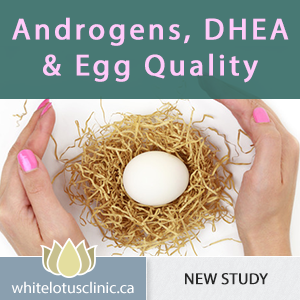When it comes to fertility, DHEA and testosterone in women are not always a bad thing. In fact, many recent studies have helped us understand that the androgenic hormones, testosterone and DHEA, play a crucial role in the maturation of small follicles in the ovary. The time of peak importance seems to be early on in the process of follicular maturation – about 2- 5 months prior to an egg being ovulated (1, 2).
A very recent study highlighted just how important testosterone levels are for egg quality in women undergoing IVF. This study examined the association of low testosterone levels in the blood and IVF outcomes in a group of women with diminished ovarian reserve (DOR) (2). Data from over 220 IVF cycles was collected and analyzed in order to understand the impact of testosterone on other hormone levels, ovarian response, and pregnancy outcomes. It was found that the rates of both implantation and clinical pregnancy were significantly different in the group of women with higher versus lower testosterone levels.
The group with higher testosterone showed clinical pregnancy rates of 40% vs. 16% and implantation rates of 22% versus 10% in the lower testosterone group (2). This study showed that in women with poor egg quality or diminished ovarian reserve undergoing IVF, the basal testosterone level was positively associated with pregnancy outcomes.
Furthermore, testosterone levels may be useful as a screening measure to predict IVF response. In addition, the observation that women with lower testosterone levels tend to be poor IVF responders, partly due to decreased implantation rates, allows us to adjust treatment protocols accordingly for these women. DHEA is a precursor hormone to testosterone, and in most women with diminished ovarian reserve, DHEA levels are low. It has been thought that there may be a connection between autoimmunity and diminished ovarian reserve, resulting in low DHEA levels in women with this condition.
Restoring adequate androgen status as well as improving endometrial receptivity for implantation can be two distinct treatment goals for women of any age with established diminished ovarian reserve, poor egg quality and lower testosterone levels.
As a Naturopathic doctor with a special interest in Fertility and Endocrinology, research studies such as this one are of high interest to me, especially given the vast number of women I treat with diminshed ovarian reserve, poor egg quality and/or years of fertility challenges. Research outcomes form the basis of treatment strategies that we use each day in our clinic to deliver the best available care to any couple undergoing fertility challenges.
References
- Gleicher N, Weghofer A, Barad D. The role of androgens in follicle maturation and ovulation induction: friend or foe in infertility treatment? Reproductive Biology and Endocrinology 2011; 9:116
- Lu Q, Shen H, Li Y, Zhang C, Wang C, Chen X, Liang R, Wei L. Low testosterone levels in women with diminished ovarian reserve impair embryo implantation rate: a retrospective case-control study. J Assist Reprod Genet. 2014 Apr;31(4):485-91.





